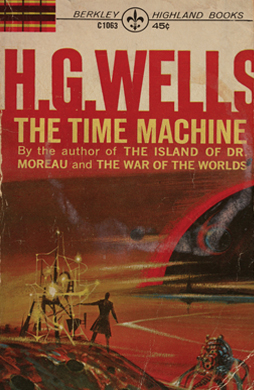
The Time Machine by HG Wells
Wells joined the ranks of future fiction writers when he published this iconic novel in 1895. It has been called the progenitor of the time travel theme in science fiction, but more important to our subgenre, he wrote a book about what was possible, and made it seem very real. The storyline is well known, having been made into at least a dozen movies at last count. Basically, the book chronicles the travels of a nameless protagonist almost a million years into the future, where he finds two classes of humanoids: a flighty, useless upper echelon and a devolved lower class that furnishes food, clothing and shelter to them -- but always in a way that keeps them dependent. According to Britannica.com, “The Time Machine is a deliberate debunking of the utopian fiction of the late nineteenth century, in particular William Morris’s News from Nowhere. Where Morris depicts a pastoral, socialist utopia, Wells represents a world in which the human struggle is doomed to failure.”
About HG Wells
H.G. Wells was born in England in 1866, to a pair of shopkeepers in Kent, England. The Time Machine -- which was his first novel -- was an instant success and, along with other classic works like The Invisible Man and War of the Worlds arguably set Wells up as a future fiction forefather. He died in 1946, six years after Orson Welles caused a national panic in the U.S. while reading a radio dramatization of War of the Worlds. The two men met for a little-known radio interview in 1940, and the author gently chided Americans for their overreaction to his story, which was broadcast on Halloween. “You aren’t quite serious in America yet,” he said to the much younger Welles. “You haven’t got the war right under your chins. Consequently, you can still play with the idea of terror and conflict. It’s a natural thing to do until you’re right up against it. And then it ceases to be a game.” Welles had no response.Futurist Themes:
- Economic Inequality
- Technology and Progress
© Copyright 2021. All Rights Reserved. | Made and Maintained by Virtual Crayon
